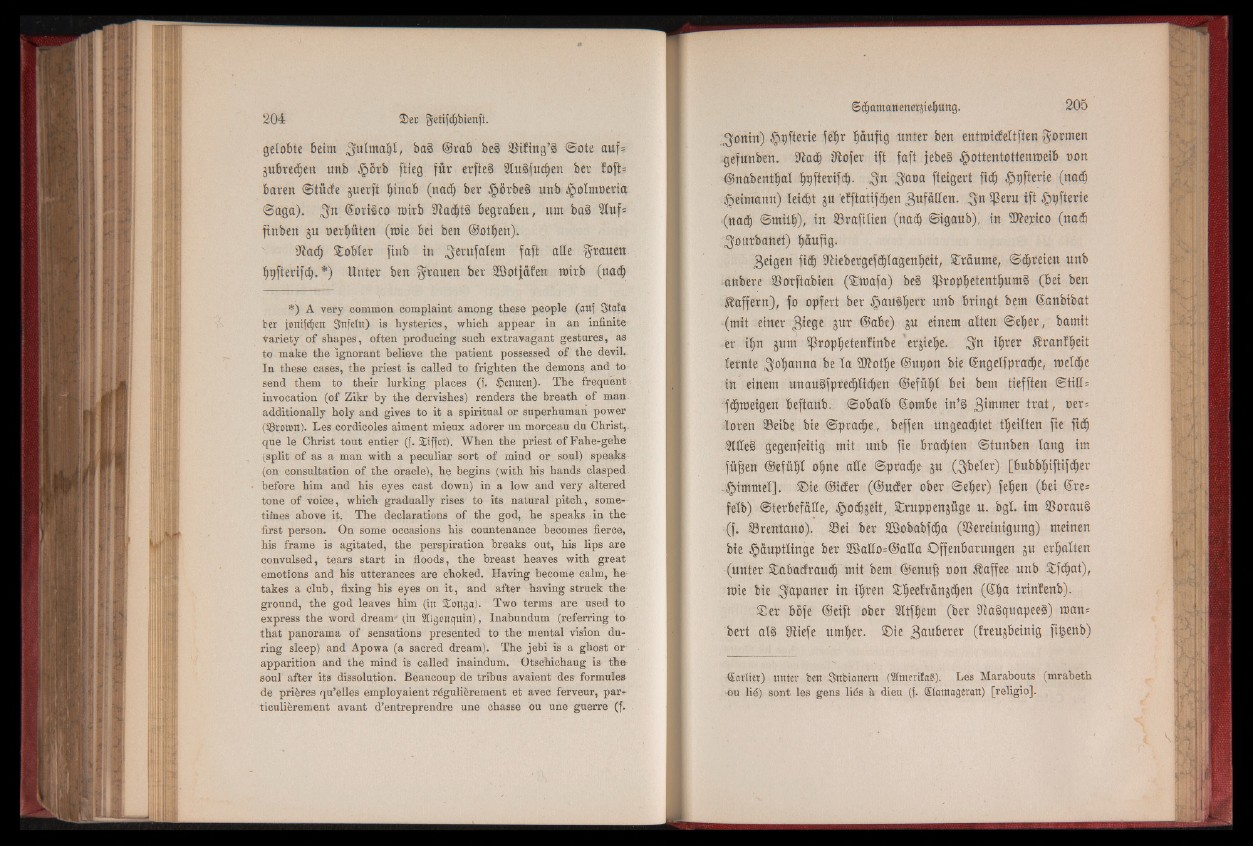
gelobte beim Bulmahl, bag ©rab beg Bifing’g ©ole auf?
gubTedjen unb Hôrb ftieg für erfieS Stugfuchen ber ioft-
baren ©tüde guerft ^inab (ttadj ber §5rbeS unb Holmoeria
@aga). $ n ©origco toirb SXiacÇtâ begraben, itm bag 2luf=
ftnben gu nerljitten (rote bei ben ©othen).
Bad) Nobler finb in Berufalem fafi atte $rauen
hpfterifch. *) Unter ben $rauen ber SBotfafen roirb (nach
*) A very common complaint among these people (auf 3ta!a
ber jonif^en Snfetn) is hysterics, which appear in an infinite
Variety of shapes, often producing such extravagant gestures, as
to make the ignorant believe the patient possessed of the devil.
In these eases, the priest is called to frighten the demons and to
send them to their lurking places (f. tpennen). The frequent
invocation (of Zikr by the dervishes) renders the breath of man
additionally holy and gives to it a spiritual or superhuman power
(SSrotoit). Les cordicoles aiment mieux adorer un morceau du Christ,,
que le Christ tout entier (f. 2nfjot). When the priest of Fahe-gehe
(split of as a man with a peculiar sort of mind or soul) speaks
(on consultation of the oracle), he begins (with his hands clasped
before him and his eyes cast down) in a low and very altered
tone of voice, which gradually rises to its natural pitch, sometimes
above it. The declarations of the god, he speaks in the
first person. On some occasions his countenance becomes fierce,
his frame is agitated, the perspiration breaks out, his lips are
convulsed, tears start in floods, the breast heaves with great
emotions and his utterances are choked. Having become calm, he
takes a club, fixing his eyes on it, and after having struck the
ground, the god leaves him (in Sbnga). Two terms are used to
express the word dream' (in SClgonquin), Inabundum (referring to
that panorama of sensations presented to the mental vision during
sleep) and Apowa (a sacred dream). The jebi is a ghost or
apparition and the mind is called inaindum. Otschichaug is the-
soul after its dissolution. Beaucoup de tribus avaient des formules
de prières qu’elles employaient régulièrement et avec ferveur, par*-
ticulièrement avant d’entreprendre une chasse ou une guerre (f.
Bonin) Hpfterie fdjr iiâufig unter ben entroicEeltften formen
gefunben. Bad) Bofer ift faft jebeg Hottentottenroeib non
{Sinabentïjal ^fterifd). Bn Baoa fteigert fief) Hpfterie (nad)
Jeimann) teidjt gu 'elftatifdjen gufßtteu. Bn fßeru ift Hpfterie
(nad) ©mitfj), in Srafitien (nadfj ©igaub), in Sieste o (nad}
Bourbanet) fiäufig.
feigen fiäj Biebergefihlagenheit, Bräunte, ©djreien unb
anbere Botfïabien (Btoafa) be§ fßrophetenthumg (bei ben
Gaffern), fo opfert ber ^aug^err unb bringt bem ©anbibat
(mit einer Biege gur ©abe) gu einem alten ©et)e r, bamit
er ihn gum 5ßropheteniinbe 'ergieße. Bn *hrer Äranf^eit
lernte Bohanna be la Biotije ©npon bie ©ngelfpradje, roeldje
in einem unaugfprechlidhett @efn|l bei bem tiefften ©ti£f=
fdjroeigen beftanb. ©obalb ©ombe in’g B^mmer tra*/ ®er=
ïoren Betbe bie ©pracfie, beffen ungeachtet t h eilten fie fid)
2I£fe§ gegenfeitig mit unb fie brachten ©tunben lang im
filmen ©efühl ohne alle ©prache gu (Bbeler) [bubbhiftifdjer
Rimmel]. Sie ©ider (©uder ober ©eher) fe^en (bei ©re=
felb) ©terbefälle, Hodjgeit, Bruppengöge u. bgl. im Boraug
(f. Brentano). Sei ber Söobabfdja (Bereinigung) meinen
bie Häuptlinge ber 2öallo=®atia Offenbarungen gu erhalten
(unter Babadraudj mit bem ©enufj non Kaffee unb Bfdjat),
roie bie Ba:Paner in i fW BheeErängdjen (©hü trinEenb).
Oer böfe ©eift ober 2ttfhem (ber Bagquapeeg) roan=
bert als Biefe umher. Oie 3 <*uberer (freugbeinig fi^enb)
QEartier) unter ben Snbianern (?fmerita8). Les Marabouts (mrabeth
•ou lié) sont les gens liés à dieu (f. Siatnageran) [religio].